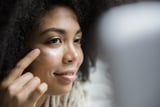dimanche 21 juin 2020
Yes, You Should Be Wearing (and Reapplying) Sunscreen While Self-Isolating Indoors

For a lot of people, the last thing they're thinking about right now is whether or not they should be reapplying sunscreen after their 1 p.m. Zoom work call. But there are a lot of reasons why you shouldn't let this essential skin-care step fall by the wayside, even if you're spending most of your time indoors.
"Daily sunscreen use can help guard against skin cancer and premature skin aging", said Dr Anjali Mahto, a London-based consultant dermatologist. That means come rain, wind, or shine, protection is key - yes, even when it's cloudy outside. To get to the bottom of why exactly wearing sunscreen is still as important as ever right now, we spoke to some of the top dermatologists and skin-care experts.
Should You Be Wearing Sunscreen Indoors?
We're sorry to say it, but just because you're indoors for the majority of your day, doesn't mean you should be skipping the SPF step. While "UVB [rays] do not penetrate through windows, UVA does", said Dr Anne Wetter, dermatologist and founder of skin-care brand Allél, which is why we still need protection. It's extra important to remember your SPF if you're sitting by a window enjoying the sunshine, because "you are still at risk of UV damage. While you may not burn when sitting next to a window, the UV exposure can cause premature aging," added Dr Susan Mayou, consultant dermatologist at the Cadogan Clinic.
And why is this protection so important? Let us all remind ourselves of this now-famous photo of a truck driver who suffered visible sun damage on one side of his face, which was exposed to the sun for an extended period of time, without SPF protection.
Now that we've concluded that, yes, you absolutely still need to wear sunscreen during social distancing, what SPF should you use? According to the experts, you need to look for a broad-spectrum sunscreen that protects against both UVA and UVB rays, and "it should be a minimum of SPF 30", said Dr Mahto.
Should You Worry About Blue Light Damage, Too?
Protecting against the sun's rays through your windows is most important here. However, there's something else you might want to take into consideration: blue light from your phone and computer screens. First, it's important to note that scientific studies draws mixed conclusions on the effects caused by blue light.
According to Dr Wetter, blue light has a very short wavelength with high energy, which can be less than ideal for the skin. Some studies - including one published in 2014 in the Free Radical Biology and Medicine Journal - showed that blue light can affect those with hyper-pigmentation issues. "Blue light can be associated with increased hyper-pigmentation/melanogenesis in the skin, i.e. melasma might be exacerbated by blue light," said Dr Wetter. For this reason she recommends using a broad-spectrum sunscreen, which protects against blue light, too.
How Often Should I Reapply Sunscreen Indoors?
Sadly, it's not always the case that after one application you're good for the day, especially if you're working with the sun blazing into your house, or working up a sweat with an at-home workout. "If you are in the sun for prolonged periods, you should be reapplying your sunscreen every two hours," said Daniel Issacs, director of research at Medik8. "This is because your sunscreen can begin to wear away and minimize levels of protection it is providing." Just as pool or ocean water can break down sunscreen, so does sweat - especially if you're doing an especially rigorous HIIT or Tabata session.
Makeup isn't protecting you from the sun, either. Although it probably isn't so much of a worry being at home (anyone else forgotten how to apply foundation?), you still need to reapply over the top of your makeup. Thanks to new nifty formulations, you can top up your SPF using facial mists and powders. However, if you don't have either of those handy, you will need to use your regular sunscreen cream or lotion.
What Are the Best Sunscreens to Wear Indoors That Won't Clog Pores?
One of the biggest issues people have with wearing sunscreen is that it can feel heavy or clog pores. This is because mineral sunscreen (also known as physical sunscreen) sits on top of the skin and causes congestion, while chemical sunscreen sinks into the skin, which can lead to irritation. Neither are ideal. However, thanks to smarter formulations, these days you shouldn't have to suffer breakouts to protect against harmful UV rays. The key is to look for the word noncomedogenic (non-clogging) on the packaging. And we hate to say it, but like all skin care, there is a degree of trial and error to find out what works best for your skin.
So, what are you waiting for? Go and wash your hands, then slather that sunscreen on your face and neck - and if you're taking things really seriously, the backs of your hands, too. If you're looking for a new sunscreen to add to your skin-care routine, read on to see our favorite, lightweight, noncomedogenic suggestions, ahead.










London Dermatology Clinics is the best skin clinic in London, as voted by its patients. The clinics offer a range of services such as Cyst, Lipoma, Mole, Eczema, Psoriasis and other skin problem. Their expert team of doctors and nurses have many years of experience treating patients with a range of conditions. They are the first choice for people looking to improve their skin, and hair care.
RépondreSupprimer